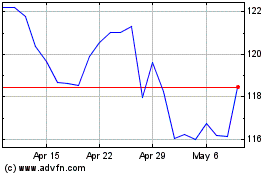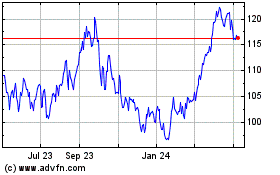Exxon Active in Sanctions Debates, but Rex Tillerson Denies Lobbying
January 11 2017 - 10:49PM
Dow Jones News
By Byron Tau, Bradley Olson and Rebecca Ballhaus
WASHINGTON -- Oil giant Exxon Mobil Corp. has a long history of
advocacy and engagement around issues related to international
sanctions, including membership in a Washington-based trade group
that strongly opposes unilateral U.S. sanctions against foreign
countries and entities.
Yet, Rex Tillerson, the former CEO of Exxon Mobil, argued
forcefully Wednesday that neither he nor his former company ever
lobbied against U.S. sanctions on Russia or Iran, a statement that
a number of senators aggressively questioned in a marathon day of
confirmation hearings over his appointment to serve in the incoming
administration of President-elect Donald Trump as secretary of
State.
"I never lobbied against the sanctions. To my knowledge, Exxon
Mobil never lobbied against the sanctions. Exxon Mobil participated
in understanding how the sanctions were going to be constructed.
And was asked and provided information regarding how those might
impact American business interest," Mr. Tillerson said to the
committee in a hearing that lasted most of Wednesday.
His testimony may reflect his interpretation that public
comments in opposition to certain sanctions and private efforts to
weaken or scale them back don't constitute a formal effort to lobby
against them.
However, his company and its outside consultants have filed more
than 30 lobbying disclosure reports, listing sanctions issues in
Iran, Russia and Libya as among its issues. Those reports didn't
specify whether Exxon supported or opposed the various sanctions
efforts -- but the company in financial disclosures and public
statements by executives like Mr. Tillerson have indicated that
sanctions often hurt the company's business interests.
In addition, the company is a dues-paying member of USA*Engage,
a corporate-funded advocacy group that opposes U.S. sanctions and
has called on lawmakers to reject unilateral efforts aimed at
punishing Iran, Russia, Myanmar and Cuba, among others.
At issue is a policy question about the use of sanctions, a
major tool of U.S. diplomacy that gives the executive branch the
ability to deter, compel or punish states, foreign individuals and
groups. In Wednesday's hearing, Mr. Tillerson expressed concerns
about the idea of sanctions, which he says can sometimes punish
U.S. businesses.
"It's important to acknowledge that when sanctions are imposed,
they by their design are going to harm American business. That's
the idea -- it's to disrupt America's business engagement in
whatever country's being targeted for sanctions," he said.
Exxon spent $8.8 million on lobbying the federal government in
the first three quarters of this year, making it the top lobbyist
in the oil-and-gas industry, according to a Center for Responsive
Politics analysis of the most recent disclosures.
Exxon has spent years lobbying the State Department on trade and
energy issues, including U.S. relations with Russia. In 2014, the
company lobbied the department over congressional legislation on
sanctions against Russia, according to federal lobbying
disclosures. The bill wasn't approved by Congress.
The company also sought to have some of its continuing projects
exempted from sanctions, a request that would have mirrored
European restrictions on business in Russia after the country
seized Ukrainian territory in 2014. The Obama administration denied
the request, and Exxon had to withdraw from some operations in the
country, according to people familiar with the matter.
Exxon sought permission for an extension to finish drilling a
well, because of safety concerns, a request that was granted. Once
Exxon exited, Russia announced that the well was a
near-billion-barrel-discovery.
Exxon has said its losses due to sanctions would amount to $1
billion, but the company sees some of its work in Russia, such as
in the Arctic, as on "pause" because of the restrictions.
A spokeswoman for USA*Engage confirmed that Exxon is a member of
the advocacy group, which is part of the National Foreign Trade
Council -- a pro-free trade industry group funded by major
corporations. The group doesn't oppose all sanctions and has backed
sanctions in conjunction with other international partners -- in
part to ensure that U.S. businesses aren't restricted while foreign
companies remain free to do business with the targets of the
sanction.
"Exxon Mobil regularly engages with lawmakers and others to
discuss the potential impact of sanctions and to express our view
that sanctions should treat American companies fairly. We do not
express an opinion as to whether or not sanctions should be
imposed; that is a decision for policy makers," said a spokesman
for the company.
In Washington, corporations routinely channel their more
controversial lobbying practices through trade associations to give
themselves "plausible deniability," said Lisa Gilbert, director of
Public Citizen's Congress Watch division.
The practice "gives them the ability to say one thing in their
mission statements or to their shareholders, and straightforwardly
support the policies out the other side of their mouths," Ms.
Gilbert said.
Write to Byron Tau at byron.tau@wsj.com, Bradley Olson at
Bradley.Olson@wsj.com and Rebecca Ballhaus at
Rebecca.Ballhaus@wsj.com
(END) Dow Jones Newswires
January 11, 2017 22:34 ET (03:34 GMT)
Copyright (c) 2017 Dow Jones & Company, Inc.
Exxon Mobil (NYSE:XOM)
Historical Stock Chart
From Mar 2024 to Apr 2024

Exxon Mobil (NYSE:XOM)
Historical Stock Chart
From Apr 2023 to Apr 2024
